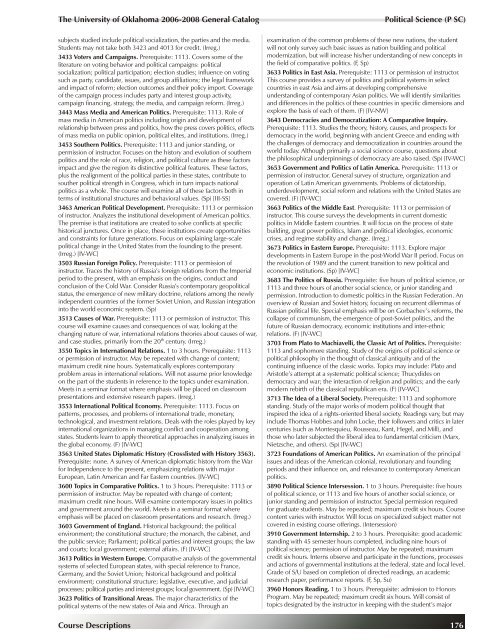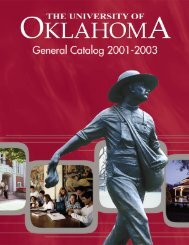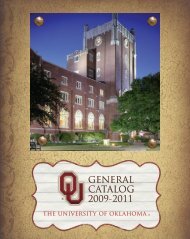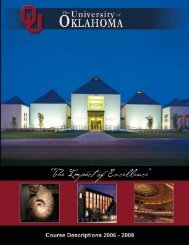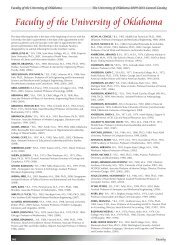ART - Catalog - University of Oklahoma
ART - Catalog - University of Oklahoma
ART - Catalog - University of Oklahoma
You also want an ePaper? Increase the reach of your titles
YUMPU automatically turns print PDFs into web optimized ePapers that Google loves.
The Uni ver sity <strong>of</strong> <strong>Oklahoma</strong> 2006-2008 Gen eral Cat a log<br />
Political Science (P SC)<br />
subjects studied include political socialization, the parties and the media.<br />
Students may not take both 3423 and 4013 for credit. (Irreg.)<br />
3433 Voters and Campaigns. Prerequisite: 1113. Covers some <strong>of</strong> the<br />
literature on voting behavior and political campaigns: political<br />
socialization; political participation; election studies; influence on voting<br />
such as party, candidate, issues, and group affiliations; the legal framework<br />
and impact <strong>of</strong> reform; election outcomes and their policy import. Coverage<br />
<strong>of</strong> the campaign process includes party and interest group activity,<br />
campaign financing, strategy, the media, and campaign reform. (Irreg.)<br />
3443 Mass Media and American Politics. Prerequisite: 1113. Role <strong>of</strong><br />
mass media in American politics including origin and development <strong>of</strong><br />
relationship between press and politics, how the press covers politics, effects<br />
<strong>of</strong> mass media on public opinion, political elites, and institutions. (Irreg.)<br />
3453 Southern Politics. Prerequisite: 1113 and junior standing, or<br />
permission <strong>of</strong> instructor. Focuses on the history and evolution <strong>of</strong> southern<br />
politics and the role <strong>of</strong> race, religion, and political culture as these factors<br />
impact and give the region its distinctive political features. These factors,<br />
plus the realignment <strong>of</strong> the political parties in these states, contribute to<br />
souther political strength in Congress, which in turn impacts national<br />
politics as a whole. The course will examine all <strong>of</strong> these factors both in<br />
terms <strong>of</strong> institutional structures and behavioral values. (Sp) [III-SS]<br />
3463 American Political Development. Prerequisite: 1113 or permission<br />
<strong>of</strong> instructor. Analyzes the institutional development <strong>of</strong> American politics.<br />
The premise is that institutions are created to solve conflicts at specific<br />
historical junctures. Once in place, these institutions create opportunities<br />
and constraints for future generations. Focus on explaining large-scale<br />
political change in the United States from the founding to the present.<br />
(Irreg.) [IV-WC]<br />
3503 Russian Foreign Policy. Prerequisite: 1113 or permission <strong>of</strong><br />
instructor. Traces the history <strong>of</strong> Russia’s foreign relations from the Imperial<br />
period to the present, with an emphasis on the origins, conduct and<br />
conclusion <strong>of</strong> the Cold War. Consider Russia’s contemporary geopolitical<br />
status, the emergence <strong>of</strong> new military doctrine, relations among the newly<br />
independent countries <strong>of</strong> the former Soviet Union, and Russian integration<br />
into the world economic system. (Sp)<br />
3513 Causes <strong>of</strong> War. Prerequisite: 1113 or permission <strong>of</strong> instructor. This<br />
course will examine causes and consequences <strong>of</strong> war, looking at the<br />
changing nature <strong>of</strong> war, international relations theories about causes <strong>of</strong> war,<br />
and case studies, primarily from the 20 th century. (Irreg.)<br />
3550 Topics in International Relations. 1 to 3 hours. Prerequisite: 1113<br />
or permission <strong>of</strong> instructor. May be repeated with change <strong>of</strong> content;<br />
maximum credit nine hours. Systematically explores contemporary<br />
problem areas in international relations. Will not assume prior knowledge<br />
on the part <strong>of</strong> the students in reference to the topics under examination.<br />
Meets in a seminar format where emphasis will be placed on classroom<br />
presentations and extensive research papers. (Irreg.)<br />
3553 International Political Economy. Prerequisite: 1113. Focus on<br />
patterns, processes, and problems <strong>of</strong> international trade, monetary,<br />
technological, and investment relations. Deals with the roles played by key<br />
international organizations in managing conflict and cooperation among<br />
states. Students learn to apply theoretical approaches in analyzing issues in<br />
the global economy. (F) [IV-WC]<br />
3563 United States Diplomatic History (Crosslisted with History 3563).<br />
Prerequisite: none. A survey <strong>of</strong> American diplomatic history from the War<br />
for Independence to the present, emphasizing relations with major<br />
European, Latin American and Far Eastern countries. [IV-WC]<br />
3600 Topics in Comparative Politics. 1 to 3 hours. Prerequisite: 1113 or<br />
permission <strong>of</strong> instructor. May be repeated with change <strong>of</strong> content;<br />
maximum credit nine hours. Will examine contemporary issues in politics<br />
and government around the world. Meets in a seminar format where<br />
emphasis will be placed on classroom presentations and research. (Irreg.)<br />
3603 Government <strong>of</strong> England. Historical background; the political<br />
environment; the constitutional structure; the monarch, the cabinet, and<br />
the public service; Parliament; political parties and interest groups; the law<br />
and courts; local government; external affairs. (F) [IV-WC]<br />
3613 Politics in Western Europe. Comparative analysis <strong>of</strong> the governmental<br />
systems <strong>of</strong> selected European states, with special reference to France,<br />
Germany, and the Soviet Union; historical background and political<br />
environment; constitutional structure; legislative, executive, and judicial<br />
processes; political parties and interest groups; local government. (Sp) [IV-WC]<br />
3623 Politics <strong>of</strong> Transitional Areas. The major characteristics <strong>of</strong> the<br />
political systems <strong>of</strong> the new states <strong>of</strong> Asia and Africa. Through an<br />
examination <strong>of</strong> the common problems <strong>of</strong> these new nations, the student<br />
will not only survey such basic issues as nation building and political<br />
modernization, but will increase his/her understanding <strong>of</strong> new concepts in<br />
the field <strong>of</strong> comparative politics. (F, Sp)<br />
3633 Politics in East Asia. Prerequisite: 1113 or permission <strong>of</strong> instructor.<br />
This course provides a survey <strong>of</strong> politics and political systems in select<br />
countries in east Asia and aims at developing comprehensive<br />
understanding <strong>of</strong> contemporary Asian politics. We will identify similarities<br />
and differences in the politics <strong>of</strong> these countries in specific dimensions and<br />
explore the basis <strong>of</strong> each <strong>of</strong> them. (F) [IV-NW]<br />
3643 Democracies and Democratization: A Comparative Inquiry.<br />
Prerequisite: 1113. Studies the theory, history, causes, and prospects for<br />
democracy in the world, beginning with ancient Greece and ending with<br />
the challenges <strong>of</strong> democracy and democratization in countries around the<br />
world today. Although primarily a social science course, questions about<br />
the philosophical underpinnings <strong>of</strong> democracy are also raised. (Sp) [IV-WC]<br />
3653 Government and Politics <strong>of</strong> Latin America. Prerequisite: 1113 or<br />
permission <strong>of</strong> instructor. General survey <strong>of</strong> structure, organization and<br />
operation <strong>of</strong> Latin American governments. Problems <strong>of</strong> dictatorship,<br />
underdevelopment, social reform and relations with the United States are<br />
covered. (F) [IV-WC]<br />
3663 Politics <strong>of</strong> the Middle East. Prerequisite: 1113 or permission <strong>of</strong><br />
instructor. This course surveys the developments in current domestic<br />
politics in Middle Eastern countries. It will focus on the process <strong>of</strong> state<br />
building, great power politics, Islam and political ideologies, economic<br />
crises, and regime stability and change. (Irreg.)<br />
3673 Politics in Eastern Europe. Prerequisite: 1113. Explore major<br />
developments in Eastern Europe in the post-World War II period. Focus on<br />
the revolution <strong>of</strong> 1989 and the current transition to new political and<br />
economic institutions. (Sp) [IV-WC]<br />
3683 The Politics <strong>of</strong> Russia. Prerequisite: five hours <strong>of</strong> political science, or<br />
1113 and three hours <strong>of</strong> another social science, or junior standing and<br />
permission. Introduction to domestic politics in the Russian Federation. An<br />
overview <strong>of</strong> Russian and Soviet history, focusing on recurrent dilemmas <strong>of</strong><br />
Russian political life. Special emphasis will be on Gorbachev’s reforms, the<br />
collapse <strong>of</strong> communism, the emergence <strong>of</strong> post-Soviet politics, and the<br />
future <strong>of</strong> Russian democracy, economic institutions and inter-ethnic<br />
relations. (F) [IV-WC]<br />
3703 From Plato to Machiavelli, the Classic Art <strong>of</strong> Politics. Prerequisite:<br />
1113 and sophomore standing. Study <strong>of</strong> the origins <strong>of</strong> political science or<br />
political philosophy in the thought <strong>of</strong> classical antiquity and <strong>of</strong> the<br />
continuing influence <strong>of</strong> the classic works. Topics may include: Plato and<br />
Aristotle’s attempt at a systematic political science; Thucydides on<br />
democracy and war; the interaction <strong>of</strong> religion and politics; and the early<br />
modern rebirth <strong>of</strong> the classical republican era. (F) [IV-WC]<br />
3713 The Idea <strong>of</strong> a Liberal Society. Prerequisite: 1113 and sophomore<br />
standing. Study <strong>of</strong> the major works <strong>of</strong> modern political thought that<br />
inspired the idea <strong>of</strong> a rights-oriented liberal society. Readings vary, but may<br />
include Thomas Hobbes and John Locke, their followers and critics in later<br />
centuries (such as Montesquieu, Rousseau, Kant, Hegel, and Mill), and<br />
those who later subjected the liberal idea to fundamental criticism (Marx,<br />
Nietzsche, and others). (Sp) [IV-WC]<br />
3723 Foundations <strong>of</strong> American Politics. An examination <strong>of</strong> the principal<br />
issues and ideas <strong>of</strong> the American colonial, revolutionary and founding<br />
periods and their influence on, and relevance to contemporary American<br />
politics.<br />
3890 Political Science Intersession. 1 to 3 hours. Prerequisite: five hours<br />
<strong>of</strong> political science, or 1113 and five hours <strong>of</strong> another social science, or<br />
junior standing and permission <strong>of</strong> instructor. Special permission required<br />
for graduate students. May be repeated; maximum credit six hours. Course<br />
content varies with instructor. Will focus on specialized subject matter not<br />
covered in existing course <strong>of</strong>ferings. (Intersession)<br />
3910 Government Internship. 2 to 3 hours. Prerequisite: good academic<br />
standing with 45 semester hours completed, including nine hours <strong>of</strong><br />
political science; permission <strong>of</strong> instructor. May be repeated; maximum<br />
credit six hours. Interns observe and participate in the functions, processes<br />
and actions <strong>of</strong> governmental institutions at the federal, state and local level.<br />
Grade <strong>of</strong> S/U based on completion <strong>of</strong> directed readings, an academic<br />
research paper, performance reports. (F, Sp, Su)<br />
3960 Honors Reading. 1 to 3 hours. Prerequisite: admission to Honors<br />
Program. May be repeated; maximum credit six hours. Will consist <strong>of</strong><br />
topics designated by the instructor in keeping with the student’s major<br />
Course Descriptions 176


